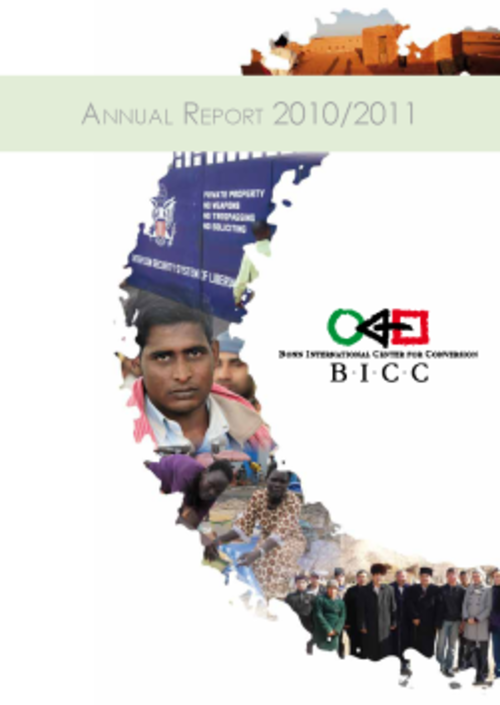Publications
Annual Report 2011
Release Date
2011-05
Language
- English
Topics
- –
Since the publication of its last Annual Report, BICC has initiated an intensive discussion on the future direction of its work. We have asked ourselves in which programmatic fields we wish to conduct and provide our applied research, advisory and training services over the years to come. We want to focus our work more strongly in order to do even better justice to our task of promoting peace, security and development throughout the world. A further central consideration was how we can establish better synergies between the contents and the methods of our research. Five focus areas have emerged and are already reflected in the project reports in the Annual Report 2010/2011.
Arms—Global Trends, exports and control: The Global Militarization Index (GMI) is unique in the way that it examines global trends in defense expenditures, armed forces personnel and militarization. The GMI ranks the most highly militarized and the least militarized states by comparing national funding for the military with gross domestic product or expenditure in other areas in society, for example health care. It offers insights that are based on both the latest data and on trends over the last twenty years since the end of the Cold War. It can thus serve policymakers as an ‘early warning mechanism’—for example, when estimating the risks of exporting arms to individual countries. This is also precisely where the 21 country reports at www.ruestungsexport.info are important. They establish connections between arms exports, development and human rights and are an excellent tool for advising policymakers.
Security—Stakeholders, systems, threats: This new program aims to understand, map and assess the security practices of various actors in different local spaces. A security practice can be broadly defined as any social activity, which seeks to articulate and engage perceived threats in a coordinated manner and over a prolonged period of time. Against this background, we ask: What demands are being placed on the state security sector, inter alia the armed forces, police, supervisory authorities, judicial and penal bodies? What role do non-state actors, such as private security services, play? This Annual Report provides the first results of a field study on commercial security in post-conflict societies such as Timor-Leste and Liberia.
A long-term expert offers advisory services to the Southern Sudan Disarmament, Demobilization and Reintegration Commission, SSDDRC, on the disarmament, demobilization and socio-economic reintegration of former combatants in Southern Sudan.
Resources and conflict: We have been studying the nexus between natural resources and conflicts and conducting lobbying and educational work on this issue since 2000. What factors lead to the fatal link between natural resources and violent conflict? What type of natural resource governance can contribute towards peace and development? BICC experts in Sierra Leone looked into the question of how diamond mining can support development, security and peace in that country.
Migration, conflicts and security: BICC investigates linkages between migration and security and intends to generate empirical data on (in)security as a driver and consequence of voluntary and involuntary migration. Eberhard Neugebohrn, Director of SUE (Stiftung Umwelt und Entwicklung Nordrhein-Westfalen), comments in an interview on a study on Migration – Integration – Development. African migrant organizations in North Rhine-Westphalia. A further project took BICC experts to Central Asia, where they conducted research primarily on issues of labor migration from Tajikistan to Russia.
Base conversion: We have more than 17 years of experience in the field of conversion and are also active internationally in the area of base conversion (inter alia in South Africa and South Korea). In this year’s Annual Report, we publish an up-to-date map of conversion sites in North Rhine-Westphalia.
BICC’s systematic and methodological generation, provision and evaluation of data does not only provide an interface for the Center’s own program areas. A cooperation project with the Federal Agency for Civic Education (bpb) launched in 2010 links BICC’s international expertise in all areas of expert, specialist analysis and in processing the relevant data and facts with the mission and the outreach of the bpb. The project’s ambitious aim is to develop a modular information portal on the topic area of war and peace for the bpb’s online services.
PDF-Download

PDF-Download

Cite as
Document-Type
BICC Annual report
Publisher
bicc
Place
Bonn



